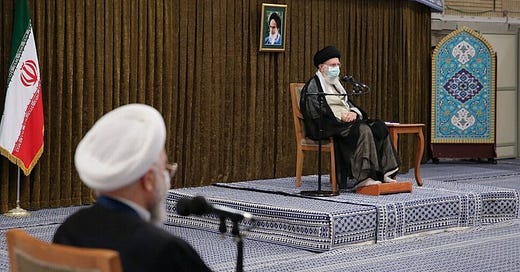Iran's Khamenei complains US seeking follow-on talks, as US urges return to Vienna negotiations
'More time is not Iran’s friend, even if they think it is,' a senior US official said, speculating talks on a deal return may not resume until September.
Iran’s Supreme Leader today (July 28) seemingly chastised outgoing president Hassan Rouhani for espousing engagement with the West, reiterating his contention that America can not be trusted and that Iran should seek to bolster its self-reliance.
Ayatollah Ali Khamenei’s commentary comes a week ahead of the inauguration of his protégé Ebrahim Raisi on August 5th, and as American and western diplomats are concerned not just at the amount of time it is taking to get back to international talks on the US and Iran returning to full implementation of the 2015 nuclear deal, but also at the prospect that the new Raisi team may be inclined to throw out the draft text reached over six previous rounds of talks, and start again at square one.
“We’ve been clear that more time is not Iran’s friend, even if they think it is,” a senior U.S. official, speaking not for attribution, told me in an interview today. “The more time we are not talking, and they are advancing their program, the more we have to think about alternatives, as the Secretary has said.”
He speculated that international talks on a mutual US and Iranian return to full implementation of the deal, formally known as the Joint Comprehensive Plan of Action (JCPOA), might not pick up again until September.
“We have not been shy that we think the best for us, the best for US national security, is to get back in the JCPOA,” the US official continued. But “now, we are putting our backs into what it looks like if there is no return. Ultimately, it is going to look a lot like the dual track strategy of the past—sanctions pressure, other forms of pressure, and a persistent offer of negotiations. It will be a question of how long it takes the Iranians to come to the idea they will not wait us out.”
Khamenei, speaking to Rouhani’s cabinet, complained that the United States is seeking to include language in the Vienna talks agreement about a commitment to follow-on talks, expressed the view that the U.S. would only lift sanctions on paper, and would not offer guarantees that Iran has sought that the US won’t quit the deal again, as Trump did in 2018.
“The Americans have set a condition,” Khamenei said, according to an English translation of his remarks on his website. “They say, ‘If you want the sanctions to be removed, we should include a clause in the agreement which states that we must negotiate and agree over certain matters in the future. If you do not accept the clause, we do not have an agreement at the present.’ What is the clause? This clause is actually a pretext for their future interference.”
“This is about the JCPOA itself, about renewing it and about various other matters, such as missiles and regional issues,” he continued. “If we say later on that we are not going to negotiate over these matters because the policies of the country and our parliament do not allow us to do so, they will say that there is no deal because we have supposedly violated it.”
“They have already violated the agreement one time without facing any difficulty for doing so,” he continued. “Now too, when they are told to promise and guarantee that they will not violate it another time, they respond that they cannot give such a guarantee….They say they cannot and will not promise such a thing.”
The US official said the team around Raisi may be miscalculating the diplomatic and economic pressures Iran could experience if there is international consensus that Iran’s decisions and actions are the reason for the failure to reach a negotiated outcome. That differs from the situation when Trump decided to quit the deal in 2018, and impose “maximum pressure,” which most of the world disagreed with, because Iran was implementing the deal. Since 2019, Iran has been gradually exceeding the deal’s limits to protest the lack of sanctions relief.
“Some of the people who are coming in with Raisi…may believe they have taken the best punch the Americans can give, and that now they will be ok,” he said. “Their critical analytical error is that our approach to pressure will look the same as the previous administrations. If we are back in the situation where the international consensus is that there is no deal because of Iran, they will face the situation of 2012, not 2019. That’s not good for them and they are fundamentally misreading their position.”
In addition, he said, without the prospect of an imminent diplomatic settlement, the international community is likely to react with much more alarm to advances in Iran’s nuclear program.
Washington’s preferred path is for a mutual return to the JCPOA, another senior US diplomat told me earlier this week.
“There’s an easy answer,” the second senior US diplomat told me. “Get back into the deal. We are prepared to lift all the sanctions that are inconsistent with the deal.”
Khamenei has a record of attacking Iranian presidents on their way out, said Sina Azodi, an Iran expert with the Atlantic Council.
“I think the main point he was making…is to tell Rouhani, ‘I told you so. You cannot trust the West and the U.S.,’” Azodi said. “But I think they are still committed to the JCPOA.”
**
Updated July 29.



